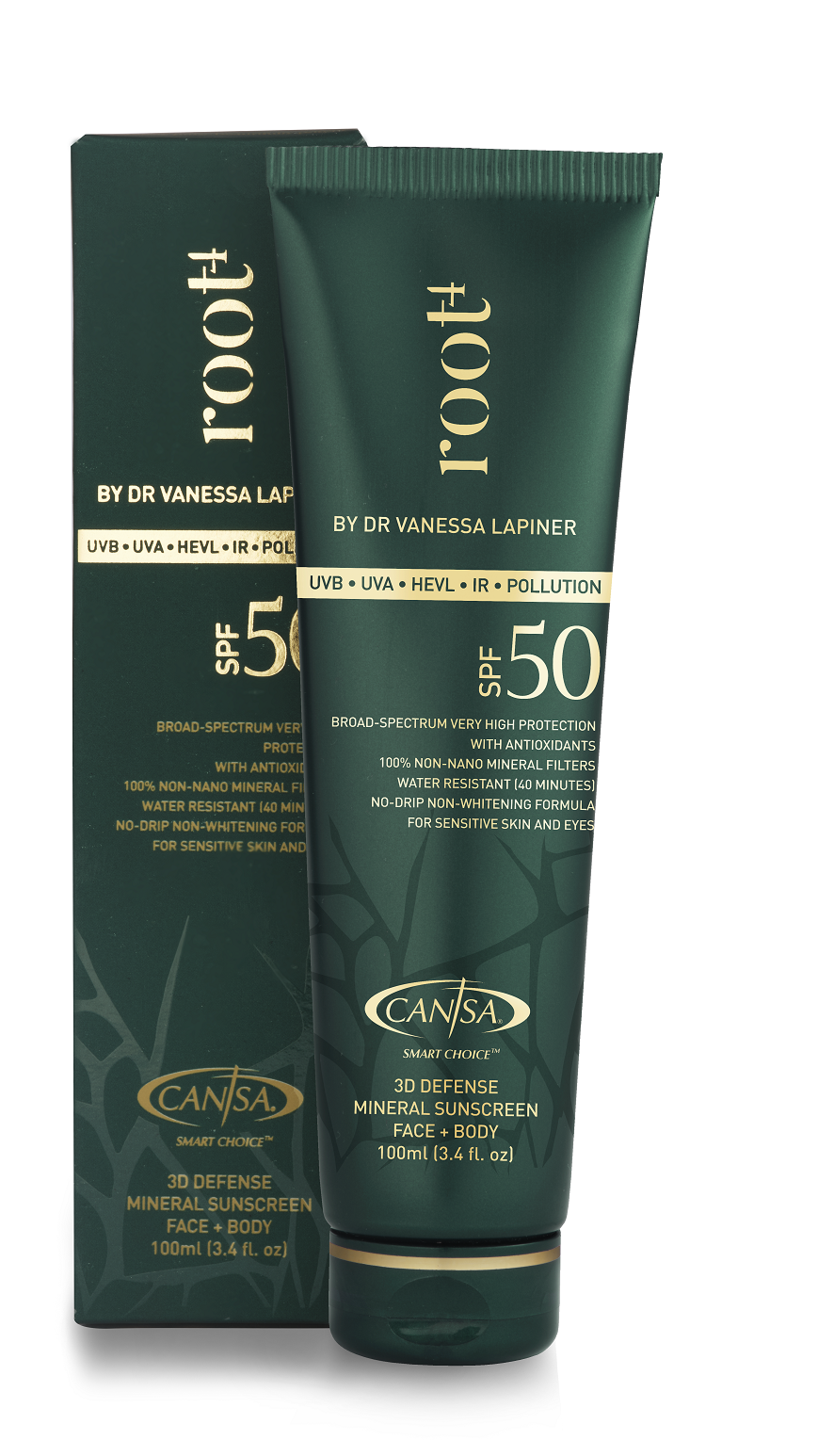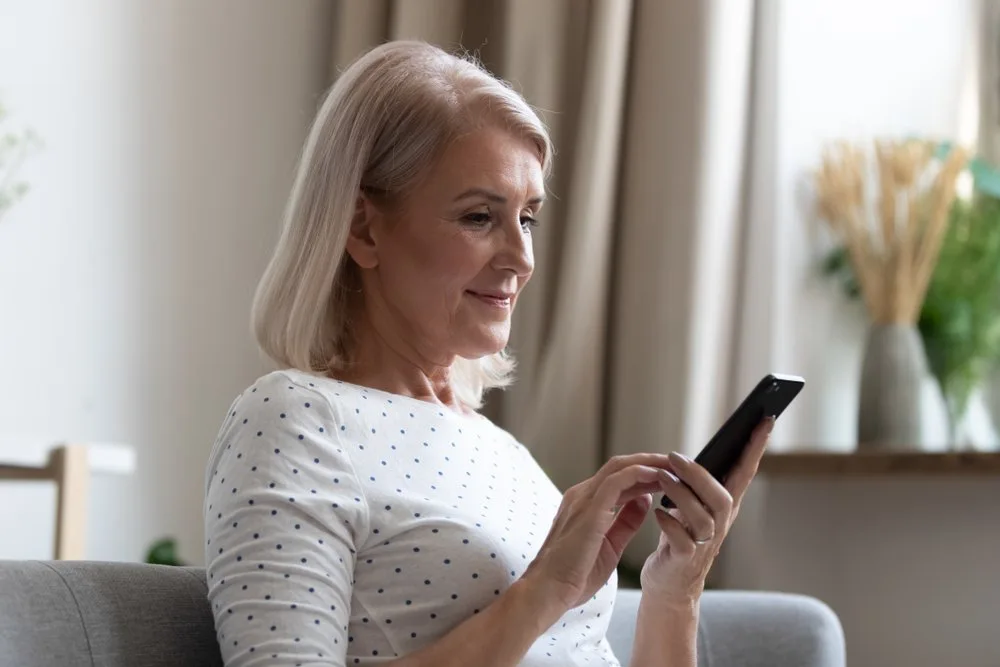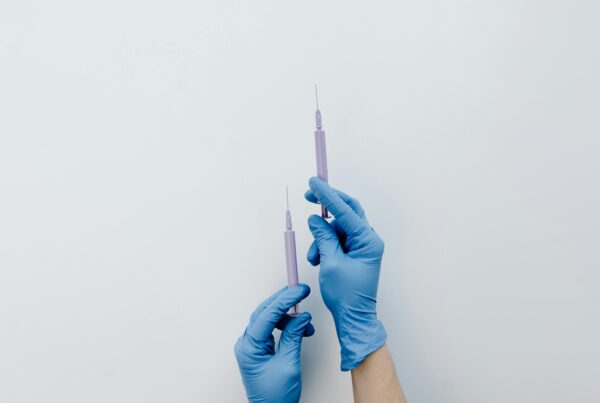So you’ve become totally au fait with staying out of the sun as much as possible, wearing wide-brimmed hats, and have made friends with your SPF. Perhaps you can casually throw snippets about the importance of protecting your skin from UVA in addition to UVB into the conversation.
Well, I’m about to rock your boat. The sun (while skin enemy number 1) is not the only threat to your smooth, even-toned skin. Damaging blue light from your cell phone or laptop is generating oxygen-free radicals while you are reading this very article (I’m sorry!).
What is blue light?
Emitted by the sun, fluorescent lights, LED lights, and electronic screens, blue light (380-500 nm) is at the higher energy end of the visible light spectrum (the light visible to the human eye which accounts for 38.9% of solar radiation). The highest intensity of emitted blue light comes from the sun, followed by (in descending order) your TV, computer screen, laptop, and cellphone. We’ve already learned that blue light can disturb our sleep and impair our vision. Well, here are some more reasons to turn down the brightness level on your devices.
What can blue light do to your skin?
In vitro studies (done in laboratories on cells in Petri dishes as opposed to studies on real humans) have shown that blue light results in reactive oxygen species (ROS) and DNA damage in our skin cells approximately equivalent to 1/4 the potency of a UV photon. But while visible light damage pales in comparison to UVA and UVB, blue light (also called HEVL or high energy visible light) is the most harmful of all the colors the human eye can see.
The longer wavelength and lower energy of blue light vs UV light suggest that blue light may penetrate deeper into the skin layers inducing DNA damage, cellular dysfunction causing cell and tissue death, skin barrier damage, loss of moisture, elasticity, and photo-aging. Blue light has also been shown to stimulate nasty enzymes in the skin which break our collagen down. But the main concern around blue light is in its ability to trigger pigmentation.
It also turns out that the potential for blue light to trigger pigmentation is dependent on how much melanin your skin has: the darker your skin – the more damage blue light can cause. Melanin absorbs visible light generating heat which can trigger more melanin production (read as pigmentation), inflammation, dilation of blood vessels, and redness. In other bad news, the pigmentation triggered by blue light is more persistent and stubborn than the pigmentation induced by UVA.
The good news:
The electronics we cannot live without emit only a fraction of the visible light emitted by the sun. There is also a ‘yin’ to the bad news of blue light ‘yang’. Blue light has been shown to increase alertness, boost memory and elevate mood (it is used in the treatment of seasonal affective disorder or the ‘winter blues’). It is also a useful treatment when it comes to acne and certain inflammatory skin conditions, and has been shown to enhance wound healing in rats.
A review article in the Journal of Cosmetic Dermatology suggests that length of exposure is key: while short-term exposure to low-energy blue light may prevent and treat some skin diseases, longer-term exposure to high-energy blue light is the problem.
Takeaway:
UV light should remain skin enemy no. 1 since its photons have a shorter wavelength, which means that they oscillate faster, carrying more energy and causing more damage per photon than visible light. And the “golden rules” to protect your skin against UV light will apply to blue light too. But there are a few additional measures to take if you’re adopting the smart approach to playing things safe until science becomes more robust:
Product choices

root4’s 3D Defense SPF50 Mineral Sunscreen
- Look for a physical sunscreen containing zinc oxide or titanium dioxide, since these naturally block blue light. My top pick is root4’s 3D Defense SPF50 Mineral Sunscreen for its luxuriously hydrating formulation without that annoying white cast.
- Boost your daily sunscreen with antioxidants to neutralize free radical damage from blue light. We love root4’s Complete Serum with resveratrol and niacinamide. It not only provides critical antioxidant defense against blue light but also lightens pigmentation.
- Another key antioxidant to look for is superoxide dismutase as superoxide production mediated by blue light (produced by flavins in the skin – the primary photosensitizers for blue light) may significantly contribute to skin aging. This super-ingredient is found in root4’s Eye Crème Solution to prevent and target under-eye pigmentation.
- If pigmentation is an issue for you, and you have a darker skin type, then pick a sunscreen with iron oxide. This will absorb blue light and protect against the darkening of pigmentation. These are mostly tinted sunscreens such as Heliocare 360 Pigment Fluid SPF50, Colorescience Total Protection Face Shield SPF50, and Bioderma Photoderm M SPF50.
Look for certain ‘specialist blue light’ ingredients such as the carefully stabilised beta-carotene (found in root4’s 3D Defense SPF50 Mineral Sunscreen), red algae (Lithothamnion calcareum found in Obagi Sun Shield Matte SPF50) or yellow lutein from marigold flowers (found in Environ’s Antioxidant Defence Cream) containing carotenoid pigments which are marketed as being able to absorb blue light. (While the evidence is still scanty around these ingredients, they do show promise.) - Turn down the brightness level of your devices or invest in a blue light screen protector.
The bottom line
Although research on blue light is concerning, the data is far from conclusive. Still, as a dermatologist, I’m always harping on to my patients that prevention is better than cure. So in that spirit – add blue light on as one more compelling reason to slather yourself in sunscreen daily 365 days of the year whether indoors or out. Your skin will thank you!
References
, , , . Blue Light Protection, Part I—Effects of blue light on the skin. J Cosmet Dermatol. 2021; 20: 714– 717. https://doi.org/10.1111/jocd.13837







![women [longevity live]](https://longevitylive.com/wp-content/uploads/2020/01/photo-of-women-walking-down-the-street-1116984-100x100.jpg)










